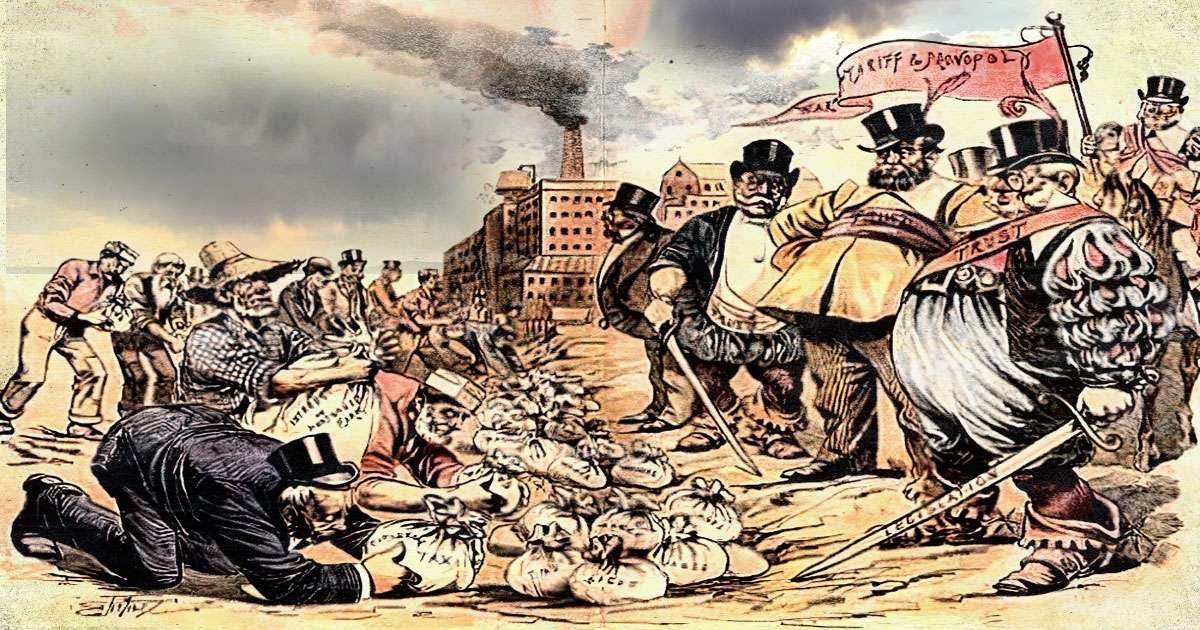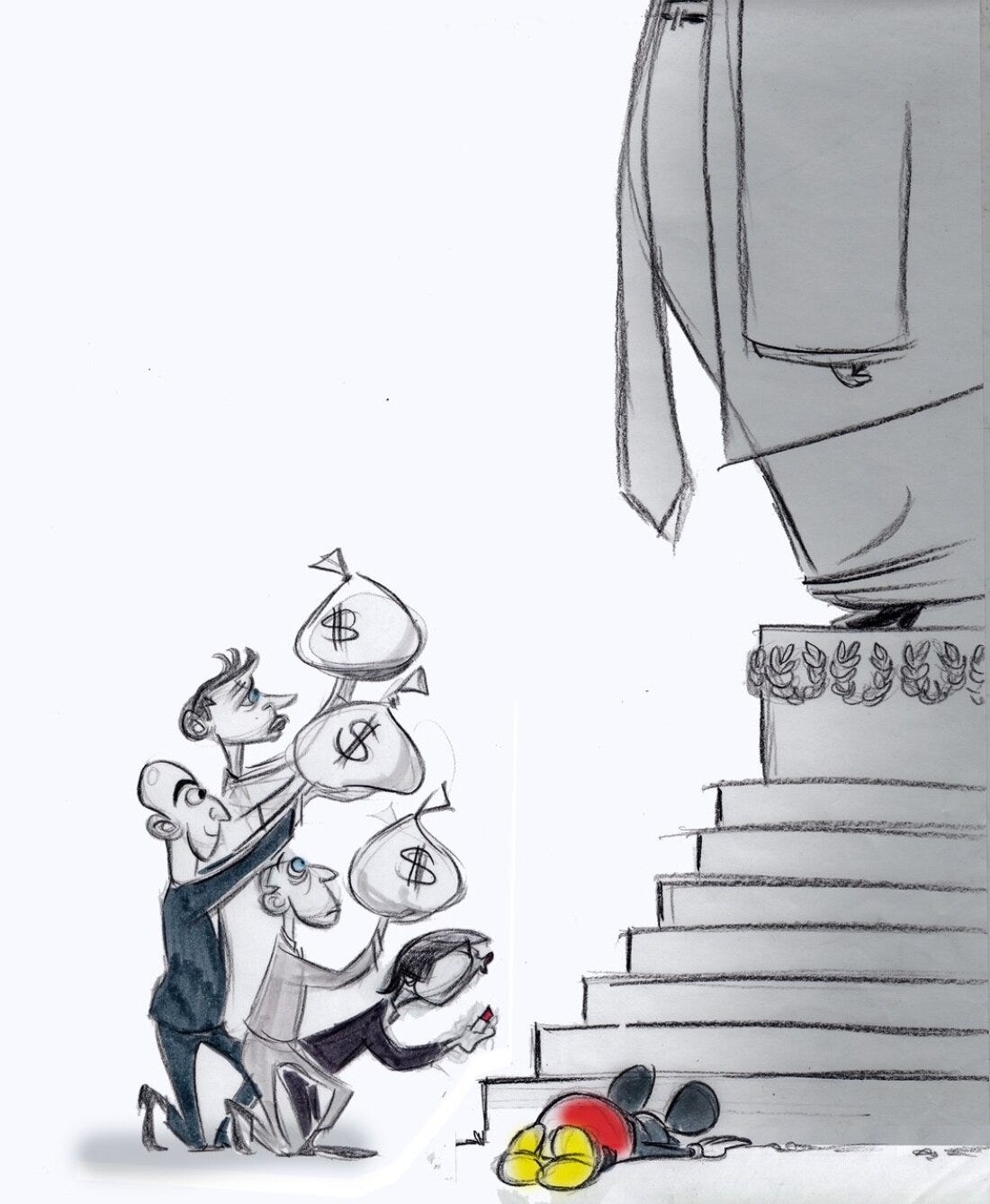"The Communism of Pelf"
Welcome to our new Gilded Age
[Chagrined editor’s note: An earlier, unedited version of this newsletter was accidentally sent out this morning (by me). My apologies. — CJS]
**
The return of an “aristocracy without nobility.”
Seems familiar, doesn’t it?
Happy Sunday.
To the Contrary is a reader-supported publication. You may disagree with me from time to time (and I expect you will, because I’m not promising you a safe space here). But I’ll always try to give it to you straight.
The knee-bending by billionaire media moguls and the enshittification of social media by the broligarchs has transformed the media landscape... and made independent outlets like Substack more vital than ever.
Please consider supporting us.
To receive new posts and support my work, consider becoming a free or paid subscriber. (And I’m immensely grateful for your generous support.)
Tomorrow’s Trumpian Restoration will inevitably bring fleeting references to the only other man to serve non-contiguous terms: Grover Cleveland, who was the 22nd and the 24th president of the United States. But leaving aside their comparable girths, the contrast between the two men is worth dwelling on for a bit.
The one consistent through-line of Donald Trump’s erratic and often incoherent career has been his passion for tariffs. It’s likely that he’ll begin his second term with decrees imposing vast new levies on friends and foes alike.
So perhaps it’s worth remembering that Grover Cleveland despised high tariffs, describing them as a “communism of pelf.” [Think of “pelf” as a 19th century word for “grift.”] In Cleveland’s view, tariffs were not merely protectionist taxes on consumers, they were also instruments of fear and favor for the economic oligarchs of his time.1
Over at Reason, Matt Rozsa has done a masterful job of resurrecting Cleveland’s blistering critique.
As he explained in a frustrated 1894 letter to Mississippi Rep. Thomas Catchings, "The trusts and combinations—the communism of pelf—whose machinations have prevented us from reaching the success we deserved, should not be forgotten nor forgiven." Yet his most consequential statement on tariff reform was a State of the Union message submitted to Congress on Dec. 6, 1887…
Cleveland believed so strongly in tariff reform that, because of that State of the Union, he was able to dedicate his entire 1888 reelection campaign to the cause of lowering them. He lost that election in a controversial squeaker, but was decisively reelected in 1892 in no small part because economic events had vindicated his warnings.
Cleveland has two main objections to the use of tariffs as an economic cudgel. More than a century ago, he recognized that they were inflationary. "When tariffs are too high, Cleveland argued, it means that corrupt politicians and businessmen are able to exploit consumers, often imposing severe hardships through price increases.”
But he also knew that they were corrupting.
“Just as bad, it means that the government is failing to treat all citizens as equal before the law, instead picking winners and losers in the aforementioned ‘communism of pelf’.”
In the midst of that earlier era’s Gilded Age, Cleveland worried about the growing gap between rich and poor. The America of 1888, he said, found “the wealth and luxury of our cities mingled with poverty and wretchedness and unremunerative toil.”
We discover that the fortunes realized by our manufacturers are no longer solely the reward of sturdy industry and enlightened foresight, but that they result from the discriminating favor of the Government and are largely built upon undue exactions from the masses of our people.
The gulf between employers and the employed is constantly widening, and classes are rapidly forming, one comprising the very rich and powerful, while in another are found the toiling poor.
As we view the achievements of aggregated capital, we discover the existence of trusts, combinations, and monopolies, while the citizen is struggling far in the rear or is trampled to death beneath an iron heel.
Cleveland blamed crony capitalism and pointed directly to the politics and abuses of the tariff system which allowed politicians to reward their buddies and punish their enemies.
[T]he Government, under pretext of an exercise of its taxing power, enters gratuitously into partnership with these favorites, to their advantage and to the injury of a vast majority of our people.
This is not equality before the law.
But then — 137 years ago — Cleveland made a striking pivot.
“Communism,” he declared, “is a hateful thing and a menace to peace and organized government.”
But he was not anticipating Bolshevism. Instead, he was talking about “the communism of combined wealth and capital, the outgrowth of overweening cupidity and selfishness, which insidiously undermines the justice and integrity of free institutions…” That form of communism — what we might call the communism of grift — “is not less dangerous than the communism of oppressed poverty and toil, which, exasperated by injustice and discontent, attacks with wild disorder the citadel of rule.”
BONUS: Cleveland would also be appalled by Trump’s neo-imperialism.
Cleveland would have no trouble recognizing today’s politics of fear, favor, and groveling. He would instantly recognize Elon, Jeff, Mark et al.
As in the original Gilded Age, none of what is happening in our time is particularly subtle. Musk himself stands to reap untold billions from his access to power, and Trump’s other billionaire potentates are fully prepared to pocket the pelf of Trump’s largesse.
**
Nota Bene: “Elon Musk’s Big Business and Conflicts of Interest With the U.S. Government” - The New York Times
Elon Musk’s influence over the federal government is extraordinary, and extraordinarily lucrative.
Mr. Musk’s rocket company, SpaceX, effectively dictates NASA’s rocket launch schedule. The Defense Department relies on him to get most of its satellites to orbit. His companies were promised $3 billion across nearly 100 different contracts last year with 17 federal agencies….
Two of Elon Musk’s companies account for at least $15.4 billion in government contracts over the past decade.
**
Brian Klaas: Faustian Capitalism
For others—the billionaire blowhards making excited pilgrimages to Mar-a-Lago—the return of authoritarian populism simply allows them to stop pretending. They can take off the “wigs with a million curls” of corporate social responsibility, ditch the “highest heeled boots” of social media press releases oozing with their predictable faux expressions of “deep concern,” and become nakedly self-serving plutocrats—just what they always were.
So grotesque is this enthusiasm that the Trump inauguration fund has already broken records, reportedly raising $170 million. Now, even those who are giving a million bucks are being turned down for VIP access since the events are so oversubscribed. When the incoming leader signals a politics of patronage, corruption, and retribution, the kings of capitalism take note.
Regardless of motivations, from Tim Cook to Mark Zuckerberg, America’s most privileged class is proactively engaging in Faustian Capitalism, selling America’s democratic soul to make a quick buck. The difference is that they didn’t have to wait for Mephistopheles to make an offer first; souls were sacrificed in advance.
**
Grift Watch
The $TRUMP memecoin — a financial asset that didn't exist on Friday afternoon — now accounts for about 89% of Donald Trump's net worth.
Why it matters: The coin (technically a token that's issued on the Solana blockchain) has massively enriched Trump personally, enabled a mechanism for the crypto industry to funnel cash to him, and created a volatile financial asset that allows anyone in the world to financially speculate on Trump's political fortunes.
After another massive overnight rally, as of Sunday morning Trump's crypto holdings were worth as much as $58 billion on paper, enough -- with his other assets -- to make him one of the world's 25 richest people.
**
TikTok basks in the favor of the Orange God King. “Trump says he will 'most likely' give TikTok 90-day extension to avoid ban.”
**
Vivek, we hardly knew ya. “Ramaswamy’s future at DOGE is in doubt as he prepares to announce bid for Ohio governor.”- POLITICO
Your Sunday dogs
The boys won’t be watching Monday’s inauguration.
**
Speaking of oligarchs in our New gilded Age:
The top 12 billionaires, known as the “oligarchic dozen,” have doubled their collective wealth since 2020, when their net worth was $1 trillion. Omar Ocampo, a researcher at the Institute for Policy Studies (IPS), calls this development “an unsettling new milestone for wealth concentration in the United States,” warning that such economic power can be used to serve narrow political interests at the expense of the broader public.
The collective wealth of America’s richest has soared by $1.3 trillion over the past three years, representing a 193 percent increase. Notable names on the list include Jeff Bezos, Elon Musk, Bill Gates, Mark Zuckerberg, Warren Buffett, and Jensen Huang, the newest member of the oligarchic dozen. Huang, co-founder and CEO of Nvidia, has seen his fortune skyrocket from $4.7 billion in 2020 to $122.4 billion—a jaw-dropping 2,504 percent increase fueled by the rapid expansion of artificial intelligence (AI).







[Chagrined editor’s note: An earlier, unedited version of this newsletter was accidentally sent out this morning (by me). My apologies. — CJS]
Trump: Pelf = Self.